It’s important to prioritize your child’s oral health from an early age, and that includes scheduling your childs first visit to the dentist what you need to know about it. Many parents may feel anxious or uncertain about what to expect during this initial appointment, but with the right preparation and guidance, it can be a positive experience for both parent and child.
Understanding the Importance of Your Child’s First Dental Visit The first dental visit is crucial for establishing a foundation of good oral health habits and identifying any potential issues early on. Even if your child doesn’t have teeth yet, it’s still recommended to schedule their first visit by their first birthday. This allows the dentist to evaluate the child’s oral development and provide guidance on proper care and hygiene moving forward.
Key Takeaways
- Schedule your child’s first dental visit by their first birthday.
- The first visit is important for establishing good oral health habits and identifying potential issues early on.
- Proper preparation and guidance can help make the experience positive for both parent and child.
Understanding the Importance of Your Child’s First Dental Visit
Taking your child to the dentist for the first time can be a daunting experience for both the parent and the child. However, it is an essential step in ensuring your child’s dental health and preventing any future dental problems. In this section, we will discuss the importance of your child’s first dental visit and what to expect during the visit.
The first dental visit is usually recommended when the child’s first tooth appears or by their first birthday. This visit is crucial in establishing a good relationship between the child and the dentist, which can help to alleviate any dental anxieties that the child may have in the future.
During the first visit, the dentist will examine the child’s teeth, gums, and mouth to ensure that they are developing correctly. The dentist will also discuss proper oral hygiene practices with the parent, such as brushing and flossing techniques.
One of the main reasons for the first dental visit is to identify any potential dental problems early on. Early detection of dental problems can prevent them from becoming more severe and costly to treat in the future. The dentist may also recommend fluoride treatments or dental sealants to help protect your child’s teeth from decay.
It is essential to prepare your child for their first dental visit by explaining to them what to expect during the visit. You can also bring along their favorite toy or book to help them feel more comfortable in the dental chair. It is also important to choose a dentist who specializes in pediatric dentistry as they have the necessary training and experience to work with children.
In summary, the first dental visit is an essential step in ensuring your child’s dental health. It is recommended to schedule the visit when the child’s first tooth appears or by their first birthday. The visit is crucial in establishing a good relationship between the child and the dentist, identifying any potential dental problems early on, and discussing proper oral hygiene practices with the parent. With proper preparation and choosing the right dentist, the first dental visit can be a positive experience for both the parent and the child.
When and Why to Schedule the First Visit
It is recommended that parents schedule their child’s first dental visit by the time their first tooth appears or no later than their first birthday. This may seem early, but it is important to establish a dental home for your child and ensure their oral health is on track from the beginning.
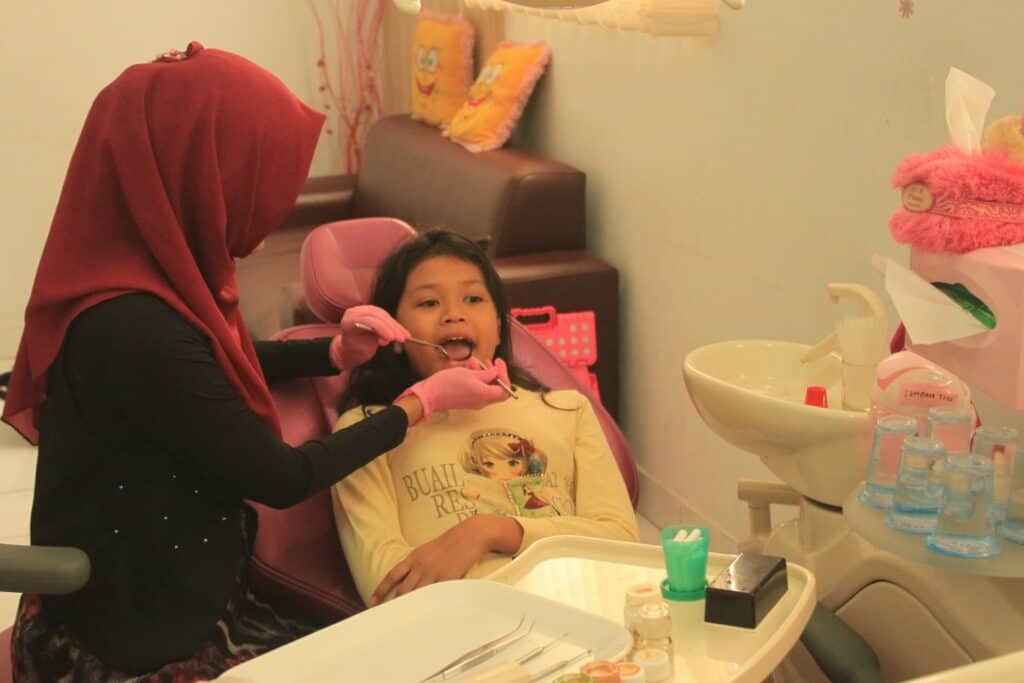
Teething can be a difficult time for infants and parents alike. By scheduling an appointment early on, parents can receive guidance on how to care for their child’s first tooth and manage any discomfort they may be experiencing. Additionally, the dentist can assess the child’s oral development and provide recommendations for future care.
Preschoolers are also at a critical stage in their oral health development. By scheduling regular dental check-ups, parents can ensure their child’s teeth are growing properly and identify any potential issues early on. This can prevent more serious dental problems from developing later in life.
Morning appointments are often recommended for young children as they tend to be more alert and cooperative in the morning. Additionally, it allows for the rest of the day to be free for other activities.
During the first visit, the dentist will likely perform a gentle examination of the child’s mouth, teeth, and gums. They may also provide guidance on infant feeding and oral hygiene practices. By scheduling regular visits, parents can ensure their child’s oral health is on track and prevent any potential issues from developing into more serious problems.
Preparing Your Child for the Dental Visit
Preparing your child for their first dental visit can be a daunting task, but it is essential to ensure that they have a positive experience. Here are some tips to help you prepare your child for their dental visit:
Books
Reading books about going to the dentist can help your child understand what to expect during their visit. Choose books with colorful illustrations and simple language that your child can easily understand.
Moral Support
Taking a family member or friend with your child to the dental visit can provide moral support and comfort. Your child will feel more at ease knowing that someone they trust is there with them.
Stuffed Animal
Allowing your child to bring their favorite stuffed animal to the dental visit can provide comfort and a sense of security. The stuffed animal can also serve as a distraction during the visit.
Positive Experience
Emphasize the positive aspects of the dental visit to your child. Explain that the dentist will help keep their teeth healthy and strong. Encourage them to ask questions and express any concerns they may have.
By following these tips, you can help your child have a positive experience during their first dental visit. Remember to be confident and knowledgeable when preparing your child, and they will be more likely to feel at ease during their visit.
What to Expect During the Visit
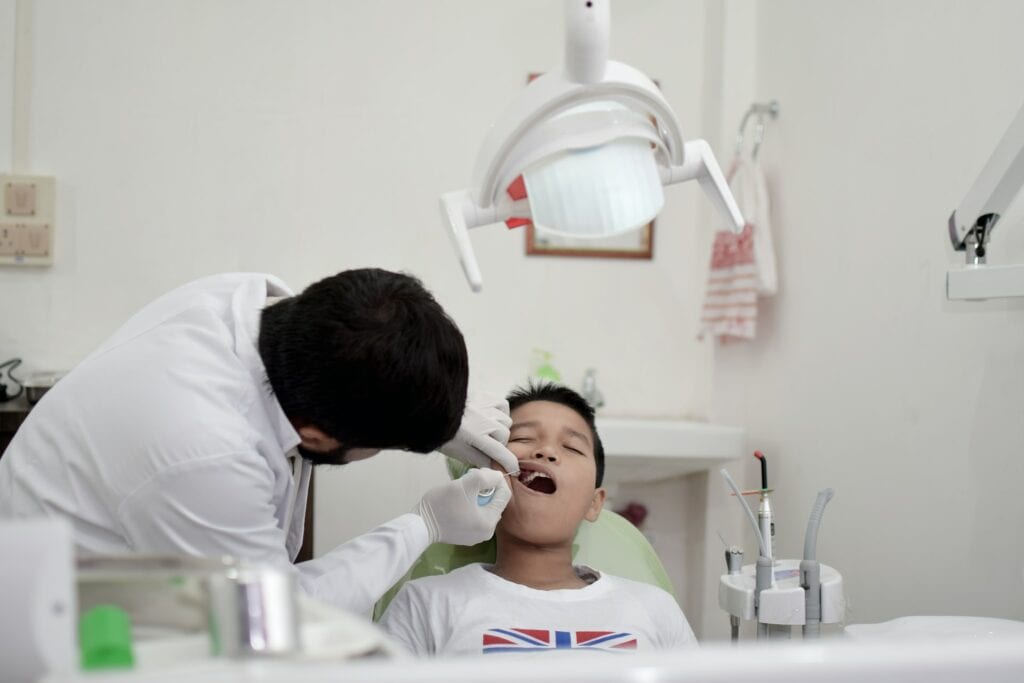
Initial Examination
The first visit to the dentist can be a little overwhelming for both the child and the parent. However, it is important to remember that the initial examination is usually a quick and simple process. The dentist will examine the child’s teeth, gums, and mouth to check for any signs of decay, gum disease, or other dental issues. They may also ask a few questions about the child’s oral hygiene routine and diet.
Possible Procedures
If the dentist finds any issues during the initial examination, they may recommend some procedures to address them. These procedures may include a gentle cleaning to remove any plaque or tartar buildup, polishing the teeth to remove surface stains, or taking x-rays to get a better look at the teeth and jawbone. The dentist will explain each procedure and answer any questions the parent or child may have.
During the dental exam, the dentist will also check the child’s bite and jaw alignment to ensure they are developing properly. If any issues are found, the dentist may recommend orthodontic treatment to correct them.
It is important to note that not all children will require procedures during their first visit to the dentist. The dentist may simply recommend regular check-ups and cleanings to maintain good oral health.
Overall, parents should expect a friendly and welcoming environment during their child’s first visit to the dentist. The dentist and staff will do their best to make the experience as comfortable and stress-free as possible.
Understanding Oral Health and Hygiene
Role of Teeth and Gums
Oral health is an essential part of overall health. Good oral hygiene habits, such as brushing and flossing, can help prevent tooth decay, gum disease, and other oral health problems. Teeth play a crucial role in the process of digestion, and healthy teeth and gums are essential for proper chewing and digestion. Teeth also play a vital role in speech and facial appearance.
Gums are the soft tissue that surrounds and supports the teeth. Healthy gums are essential for maintaining healthy teeth. Gum disease, also known as periodontal disease, is a common condition that affects the gums and can lead to tooth loss if left untreated.
Importance of Brushing and Flossing
Brushing and flossing are the foundation of good oral hygiene. Brushing twice a day with fluoride toothpaste can help remove plaque and prevent tooth decay. Flossing once a day can help remove food particles and plaque from between the teeth and along the gum line.
It is essential to use the right toothbrush and toothpaste to maintain good oral hygiene. A soft-bristled toothbrush is gentle on the gums and teeth and can effectively remove plaque and food particles. Fluoride toothpaste helps strengthen tooth enamel and prevent tooth decay.
Regular dental check-ups and professional cleanings can also help maintain good oral health and prevent oral health problems. Parents should encourage their children to develop good oral hygiene habits from a young age and make regular visits to the dentist a priority.
In summary, understanding the role of teeth and gums and the importance of brushing and flossing is crucial for maintaining good oral health and hygiene. Parents should encourage their children to develop good oral hygiene habits and make regular visits to the dentist a priority to prevent oral health problems.
Preventing Tooth Decay and Cavities
Regular dental checkups are essential to prevent tooth decay and cavities. However, there are some simple steps that parents can take at home to help prevent their child from developing cavities.
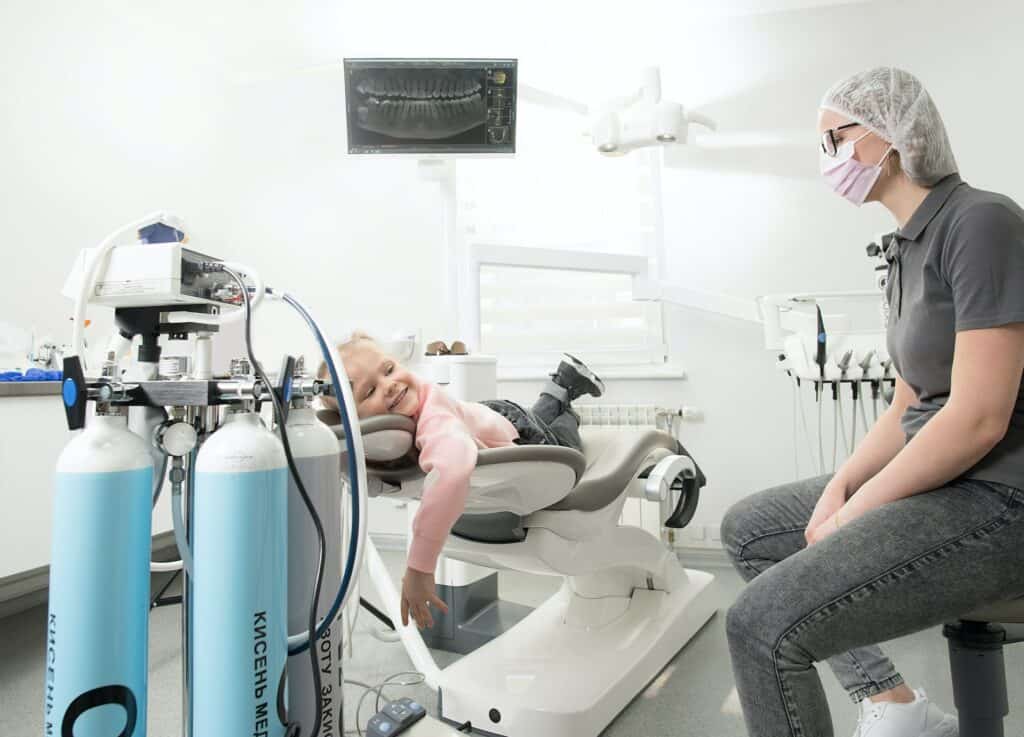
Fluoride is a mineral that helps strengthen tooth enamel and prevent decay. Most tap water contains fluoride, but if your tap water does not, your dentist may recommend fluoride supplements. Additionally, brushing your child’s teeth with fluoride toothpaste twice a day can help prevent cavities.
It is also important to limit sugary drinks and snacks. Sugar feeds the bacteria in the mouth, which produces acid that can erode tooth enamel. Encouraging your child to drink water instead of sugary drinks and to eat healthy snacks such as fruits and vegetables can help prevent cavities.
If your child does develop a cavity, it is important to have it filled promptly. Leaving a cavity untreated can lead to pain, infection, and even tooth loss. Your child’s dentist can fill cavities with a variety of materials, including silver amalgam, composite resin, and porcelain.
In summary, preventing tooth decay and cavities involves a combination of regular dental checkups, fluoride, healthy eating habits, and prompt treatment of cavities. By following these simple steps, parents can help ensure their child’s oral health.
Feeding Practices and Their Impact on Dental Health
The feeding practices of infants can have a significant impact on their dental health. One of the most common dental problems seen in infants is baby bottle tooth decay. This condition is caused by prolonged exposure of the teeth to sugary liquids, such as formula, milk, or juice.
To prevent baby bottle tooth decay, it is recommended that parents avoid putting their infants to bed with a bottle. If an infant needs a bottle to fall asleep, it should only contain water. Additionally, parents should limit the amount of sugary drinks their infants consume and encourage them to drink from a cup as soon as possible.
Infant feeding practices can also affect dental health. Breastfeeding is recommended for the first six months of an infant’s life, as it can help promote healthy jaw development and reduce the risk of tooth decay. However, once teeth start to emerge, it is important to clean them regularly.
Mouth cleaning should begin as soon as the first tooth appears. Parents can clean their infant’s teeth with a soft-bristled toothbrush and a small amount of fluoride toothpaste. It is also recommended that parents supervise their children’s brushing until they are able to do it on their own.
In addition to feeding practices, the type of foods and drinks infants and children consume can also impact dental health. Sweetened drinks, such as soda and juice, can contribute to tooth decay. Sticky candies and fruit leather can also be problematic, as they can stick to teeth and promote decay.
Overall, it is important for parents to be aware of the impact of feeding practices on their child’s dental health. By encouraging healthy habits and limiting sugary drinks and snacks, parents can help promote healthy teeth and gums for their children.
Habits Affecting Child’s Dental Health
Parents play an important role in maintaining their child’s dental health. One of the ways they can do this is by monitoring their child’s habits. Certain habits can have a negative impact on a child’s dental health, and it is important to be aware of them.
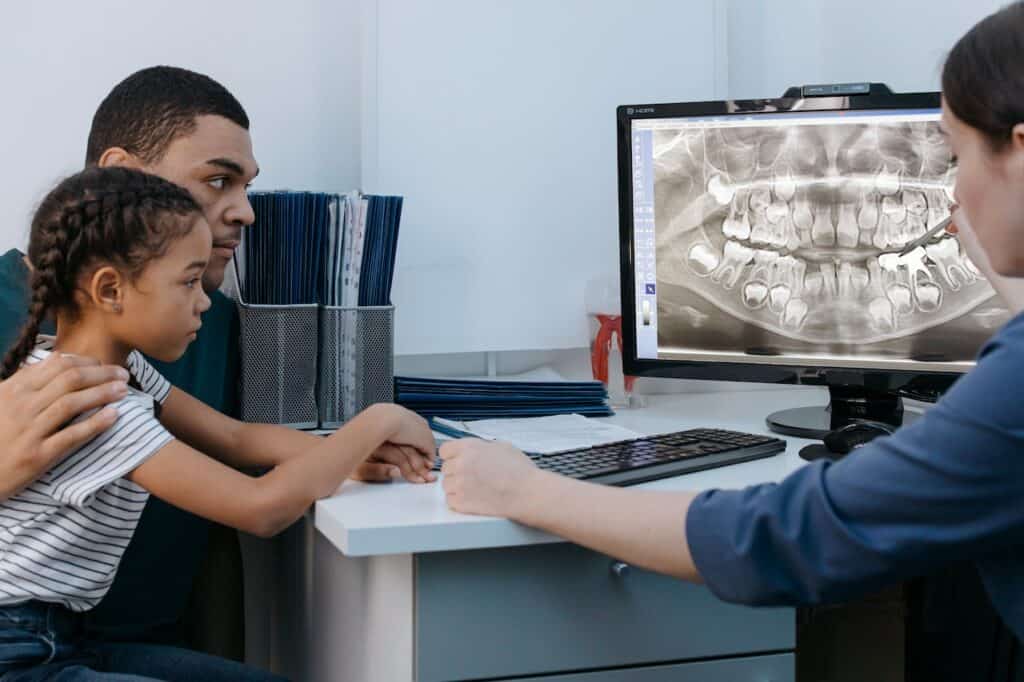
Pacifier Habits
Pacifiers are a common tool used to soothe babies, but prolonged use can lead to dental problems. The American Academy of Pediatric Dentistry recommends that children stop using pacifiers by the age of two. Prolonged pacifier use can cause misalignment of teeth and affect the child’s bite.
Finger-Sucking Habits
Finger-sucking is a common habit among infants and young children. While it is a natural way for children to self-soothe, prolonged finger-sucking can lead to dental problems. It can cause misalignment of teeth and affect the child’s bite.
Thumb-Sucking
Thumb-sucking is another common habit among infants and young children. Like finger-sucking, prolonged thumb-sucking can lead to dental problems. It can cause misalignment of teeth and affect the child’s bite. The American Dental Association recommends that children stop thumb-sucking by the age of four.
Pacifier Use
Pacifiers can be a useful tool for soothing babies, but prolonged use can lead to dental problems. It is important to monitor pacifier use and encourage the child to stop using it by the age of two. Like finger-sucking and thumb-sucking, prolonged pacifier use can cause misalignment of teeth and affect the child’s bite.
In conclusion, parents should be aware of their child’s habits and how they can affect their dental health. By monitoring habits like pacifier use, finger-sucking, and thumb-sucking, parents can help prevent dental problems and ensure their child’s teeth develop properly.
Dealing with Potential Dental Problems
During a child’s first dental visit, the dentist may identify potential dental problems that require further attention. It is important for parents to be aware of these potential issues and how to address them.
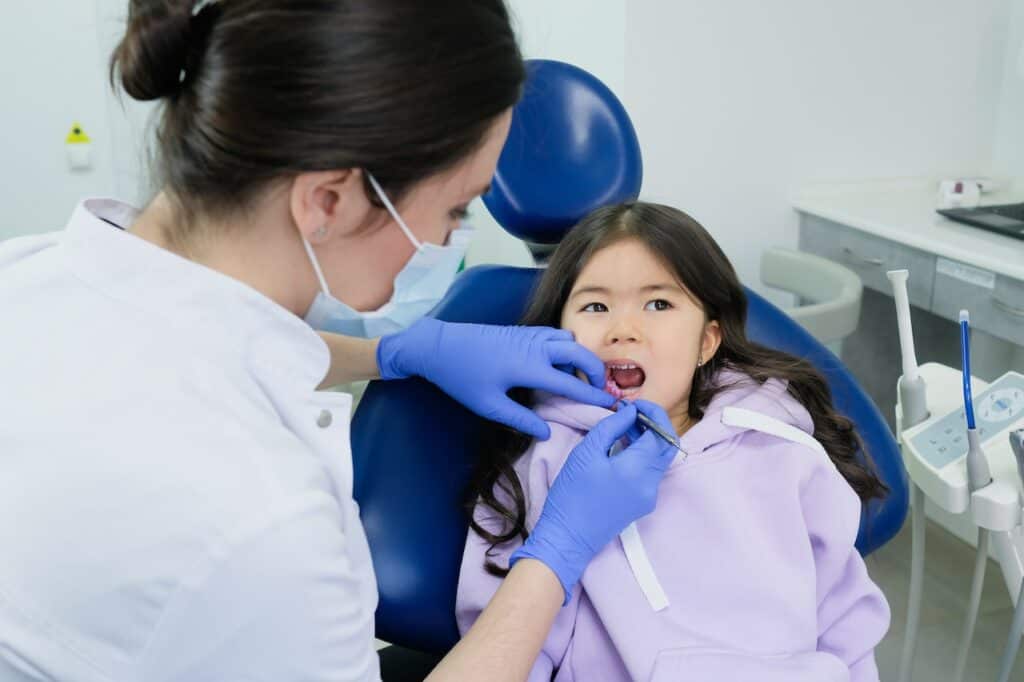
1. Health History
The dentist will ask for the child’s health history, including any medications or allergies. Certain medical conditions or medications can affect dental health, so it is important to provide accurate information.
2. Jaw Problems
The dentist will also examine the child’s jaw to ensure it is developing properly. Jaw problems can lead to issues with bite and alignment, which can result in dental problems later on.
3. Cleaning
The dentist will demonstrate proper brushing and flossing techniques for parents to use at home. Good oral hygiene habits are essential for preventing dental problems.
4. Behavior
Some children may be anxious or fearful during their first dental visit. The dentist and staff are trained to work with children and make the experience as comfortable as possible. Parents can also help by remaining calm and reassuring.
5. Dental Problems
If the dentist identifies any dental problems, such as cavities or gum disease, they will discuss treatment options with the parents. It is important to address these issues as soon as possible to prevent further damage.
6. Injuries
If the child has experienced any dental injuries, such as a chipped or knocked-out tooth, the dentist will provide immediate treatment. Parents should also be aware of how to handle dental emergencies at home.
By being aware of these potential dental problems and how to address them, parents can help ensure their child’s dental health. Regular dental check-ups and good oral hygiene habits can prevent many dental problems before they occur.
Choosing the Right Pediatric Dentist
Choosing the right pediatric dentist for your toddler can be a daunting task. It is important to find a dentist who specializes in treating children and who has experience in dealing with the unique challenges that come with treating young patients. Here are some things to consider when choosing a pediatric dentist:
- Look for a dentist who is board-certified in pediatric dentistry. This means that the dentist has completed additional training in treating children and has passed a rigorous exam.
- Ask for recommendations from your pediatrician or other parents. Word-of-mouth recommendations are often the best way to find a good dentist.
- Visit the dentist’s office before making an appointment. Check to see if the office is child-friendly and if the staff is welcoming and knowledgeable about treating children.
- Ask about the dentist’s approach to treating children. A good pediatric dentist will use techniques that are gentle and non-threatening to help put your child at ease.
- Consider the location of the dentist’s office. A dentist who is conveniently located will make it easier for you to keep regular appointments.
By taking the time to choose the right pediatric dentist, you can help ensure that your child has a positive experience at the dentist and develops good oral hygiene habits that will last a lifetime.
Understanding Dental Insurance and Special Needs
When it comes to dental visits for children with special needs, it’s important to understand how dental insurance works. Dental insurance can help cover the costs of routine checkups and treatments, but it’s important to know what your plan covers and what it doesn’t.
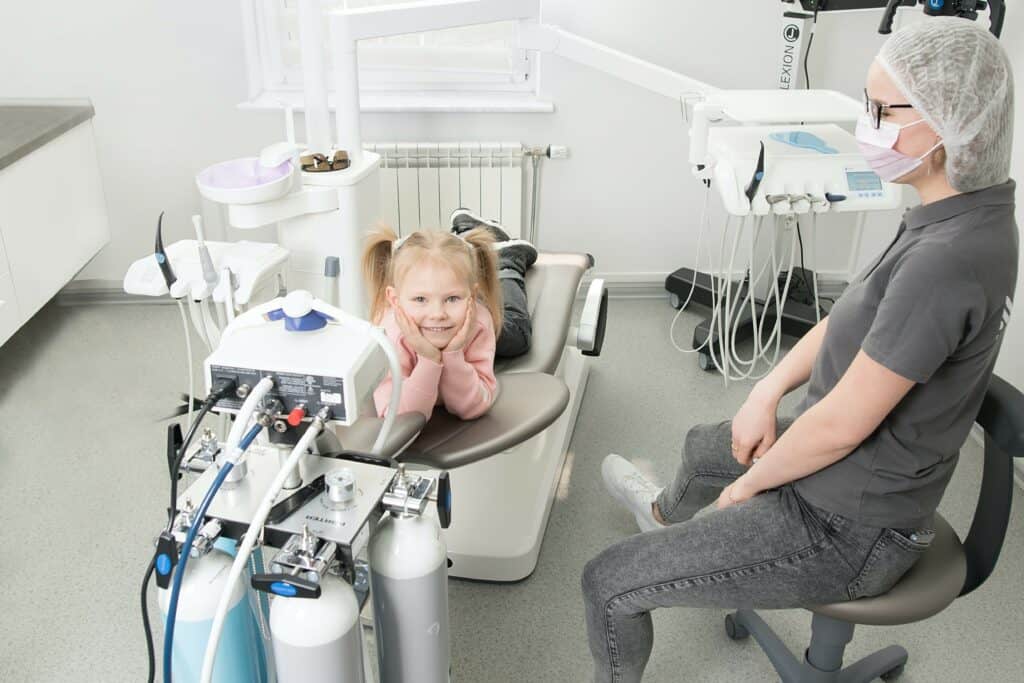
Some dental plans may have restrictions on coverage for children with special needs, so it’s important to speak with your insurance provider to understand your coverage options. You may also want to consider supplemental insurance plans or dental savings plans to help cover any additional costs.
If your child has special needs, it’s important to let the dentist know ahead of time. The dentist can then take steps to ensure that the visit is as comfortable and stress-free as possible. They may also need to make accommodations for any medications or developmental problems.
Overall, understanding your dental insurance coverage and communicating with your dentist about your child’s special needs can help make their first visit to the dentist a positive experience.
Also, you might find these article interesting:
Frequently Asked Questions
At what age should a child have their first dental visit?
The American Dental Association recommends that children should have their first dental visit by their first birthday. This visit is important for the dentist to assess the child’s oral health and to provide guidance on proper oral hygiene practices.
What can I expect during my child’s first dental visit?
During your child’s first dental visit, the dentist will examine their mouth, teeth, and gums. They will also discuss proper oral hygiene practices and answer any questions you may have. The dentist may also take x-rays to check for any underlying issues.
How can I prepare my child for their first dental visit?
To prepare your child for their first dental visit, it’s important to talk to them about what to expect. You can also read books or watch videos about going to the dentist to help ease any fears or anxiety. It’s also important to choose a pediatric dentist who specializes in treating children and has a child-friendly office environment.
What are some common procedures during a child’s first dental visit?
During a child’s first dental visit, the dentist may perform a cleaning, fluoride treatment, and take x-rays. They may also apply sealants to protect against cavities.
How often should a child visit the dentist after their first visit?
After their first visit, children should visit the dentist every six months for regular check-ups and cleanings. However, the frequency of visits may vary depending on the child’s oral health needs.
What are some tips for making my child’s first dental appointment a positive experience?
To make your child’s first dental appointment a positive experience, it’s important to choose a pediatric dentist who specializes in treating children. You can also bring a favorite toy or book to help your child feel more comfortable. It’s also important to remain calm and positive during the appointment to help ease any fears or anxiety your child may have.

Iesha is a loving mother of 2 beautiful children. She’s an active parent who enjoys indoor and outdoor adventures with her family. Her mission is to share practical and realistic parenting advice to help the parenting community becoming stronger.
